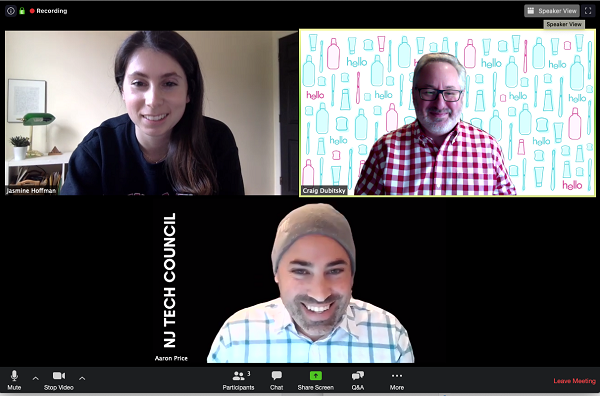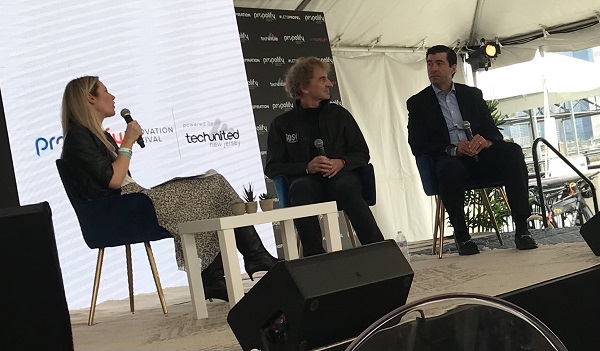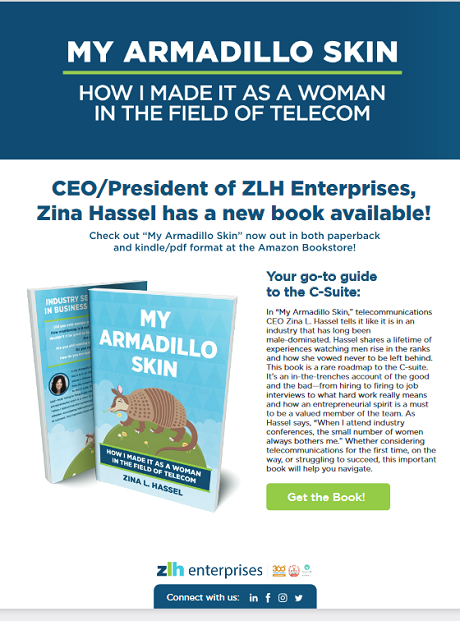Montclair Entrepreneur Dubitsky — Who Sold Hello Products to Colgate — Talks About Entrepreneurship During NJTC Webinar
Craig Dubitsky first got a taste for the entrepreneur’s life when he was 9.
“I literally was a little kid with a lemonade stand. But my lemonade stand had a car wash, and I would wash your car, and I had kids in the neighborhood come to work as car washers and lemonade servers. If we were washing your car, you were a captive audience, so I was upselling and cross-selling lemonade as a kid,” he said.
Earlier this month, Dubitsky sat down with New Jersey Tech Council CEOAaron Price during an ELEVATE Leadership Series webinar to discuss his inspiration, innovation, early business ventures and his motivation for creating Hello Products (Montclair).
From his early lemonade stand days, through college (where he ran a late-night food service, dormitory carpeting business and student moving outfit), and until today, Dubitsky has been guided by something his parents instilled in him.
At home, “it was celebrated to try new things. So, there was no fear of failure. There was a fear of not trying,” Dubitsky said.
No doubt, that fearless mindset paved the way for the deal in which Colgate-Palmolive acquired Hello Products for an undisclosed price.
“I wouldn’t say we were sold to Colgate as much as we joined Colgate,” he said.
“Hello became the fastest-growing oral care brand in America, with the number-one natural toothpaste, and its mouthwash in some of the largest retailers,” he said. “Colgate is the largest oral care company in the world; they operate in over 200 countries and employ over 35,000 people.
“I wouldn’t say we were sold to Colgate as much as we joined Colgate,” Craig Dubitsky, Hello Products
“It’s been a beautiful marriage, a real partnership,’’ he said. “We are excited to be able deliver even more naturally friendly products to even more people. We’re an egalitarian brand that marries value and values and ethics and aesthetics; those are big ideals, and I want people to join what we’re doing, and not merely transact.
“Colgate has said, ‘You guys keep doing what you’re doing,’ and that was such a beautiful thing. They are not messing with our culture of operations. They are enhancing our ability to do even more.”
Dubitsky recalled that he had originally been inspired during a walk through a drug store on Sixth Avenue in New York City about 10 years ago, observing items on the shelves, including their designs, checking out form and function. Then he had a lightbulb moment. “I’m stuck dead in my tracks in front of the oral care section. In the center, there is a picture of an extracted tooth. I stood there, looking at all of the oral care packaging and news on these extracted teeth, and I said this is really crazy.
“So, I start to look at the ingredients and, hey, there’s saccharin; and didn’t diet soda get rid of saccharin 30 years ago? I keep looking, and I see this other ingredient that has been banned by the FDA from hand soap, and it’s going in your mouth and your kids’ mouths. That’s crazy.”
Dubitsky also disapproved of the underlying message of these products. “I took this major macro step back, and it hits me that everything in this whole category is driven by fear and shame, and is designed to scare the hell out of you,” he said.
You have to be prepared that starting a company, creating a product, and running a business is going to suck for a while. Walls you’ve never imagined are going to be put in front of you — like a giant virus affecting the whole freaking planet. ”Craig Dubitsky of Hello Products
“The world is scary enough. I don’t need scare tactics in the stuff I have to use every day. When it came time to name our product, I thought, ‘What’s the friendliest word I can think of?’ It was ‘hello,’ and I trademarked the word all over the world for the relevant categories. People were like, ‘You can’t do that,’ and I said, ‘Well, I did.’
“I wanted to make a product that was better, and a company culture that was better, too,” Dubitsky said.
“Hello feels great in your hands. It’s made in America. It’s cruelty free. Our boxes are made with FCS [Forest Stewardship Council-certified] paper, so we don’t kill more trees, and it’s printed with soy-based inks,” he noted. Regarding the company culture, he added, “Hello is majority women. Our CEO is a woman. Our head of sales is a woman. Our head of marketing is a woman. We are a modern company. No one works at Hello. They join Hello. We like to say it never feels like work.”
Inspiration and Innovation
On inspiration, he said, “My mom always encouraged me. Not that my dad didn’t. My dad did, too. But my mom was more in touch with her creative side and always felt there were creative solutions for anything; and she always encouraged me to try new things.”
On the coronavirus, he said, “We have not missed any orders or have not shipped because of COVID-19, and we built this thing to really grow. We’ve got products available in over 45,000 stores, and we’re also available on Amazon, Target.com, Walmart.com, Thrive Market and Groove Collaborative. We shut down our e-commerce site for the moment, and we closed our office and we’ve been working from home, like so many of us.”
On innovation, he noted, “The key questions to ask are pretty simple: Is there a real place in the world for this thing? Are you solving for anything? You have to fall in love with the problem. As soon as you think you’ve solved the problem, you’re done for. Never rest. Stay passionate about your problem. I never think I have found the solution. I think I have identified the problem, and I become obsessed with it.”
Dubitsky said that he had been “so fortunate to be able to bring together some incredibly talented and sophisticated people who were going to take a good idea and make it real, and that’s the big difference between someone with an idea and an innovator. Innovators take an idea and they make it real. To be a good entrepreneur, you have to realize that it takes a lot of people to help make a simple idea into a real product and a company, and you have to be humble and grateful and appreciative of other people in what they bring to the table. And you have to let them shine.
“I meet a lot of entrepreneurs, and they all want to start something and get acquired. If you are building something just because your dream is to have a financial exit, that’s not good enough. You have to be prepared that starting a company, creating a product, and running a business is going to suck for a while. It’s going to be hard. You are going to fail. Walls you’ve never imagined are going to be put in front of you — like a giant virus affecting the whole freaking planet. That’s a very real and very current example,” he said. “And you have to be in love you so much with the problem that your idea is going to solve that you are never going to stop making your thing better, and the best thing for as many people as possible.”




